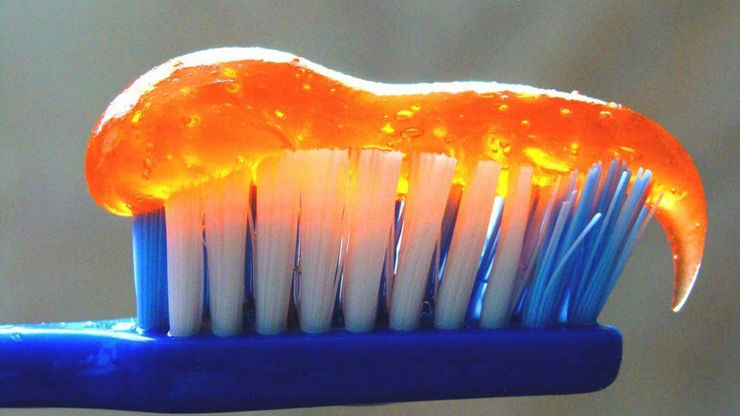
Researchers say the amount of triclosan in household products is producing a significant increase in resistant bacteria.
Triclosan has been banned from body washes, but it is still allowed in toothpaste. Getty Images
If you had a choice, would you rather reduce plaque and gingivitis in your mouth or survive your next hospital stay?
On the face of it, that’s an absurd question. People would certainly choose survival over small improvements to oral hygiene.
But that scenario cuts to the heart of the debate around the use of antibacterial compounds in consumer products — compounds that could be creating dangerous antibiotic-resistant germs that soon could make once trivial maladies untreatable.
For instance, triclosan, an antimicrobial chemical found in toothpastes and mouthwash, may reduce the effectiveness of some antibiotic drugs by 100-fold, a new study from researchers at Washington University in St. Louis suggests.
powered by Rubicon Project
The research
The new study involving mice found that triclosan in the bloodstream made bactericidal antibiotics significantly less effective.
These particular antibiotics kill bacterial cells rather than simply inhibiting their growth.
“Normally, 1 in a million cells survive antibiotics and a functioning immune system can control them. But triclosan was shifting the number of cells,” Petra Levin, PhD, a study co-author and professor of biology in arts and sciences at Washington University, said in a press release. “Instead of only 1 in a million bacteria surviving, 1 in 10 organisms survived after 20 hours. Now, the immune system is overwhelmed.”
Triclosan created antibiotic resistance in a wide range of antibiotics, but the most notable was ciprofloxacin (brand name Cipro), commonly used to treat urinary tract infections (UTIs), according to Corey Westfall, a postdoctoral fellow in The Levin Lab at Washington University.
That’s a potential recipe for disaster.
That’s because UTIs are both common among the general population and Cipro is a first-line treatment for the condition.
More than 7 in 10 adults in the United States have detectable levels of triclosan in their urine.
In fact, the researchers found 100 times more bacteria in mice treated for UTIs who drank water dosed with triclosan compared to those that were not exposed to the antibacterial compound.
“If the difference in the number of bacteria between the groups was less than tenfold, it would be difficult to make a strong case that the triclosan was the culprit,” Levin said. “[But] the magnitude of the difference in bacterial load between the mice that drank triclosan-spiked water and those that didn’t is striking.”
Triclosan’s long history
While people should never draw too many firm conclusions from nonhuman studies, this is far from the first time this particular antibacterial compound has been noted for its role in creating antibiotic resistance.
Evidence of triclosan’s potential negative effects — from endocrine disruption to reduce sperm count to the creation of antibiotic “superbugs” — led the Food and Drug Administration (FDA) in 2016 to tell companies to stop marketing hand and bar soaps as well as body washes that contain the compound.
But that recommendation did not extend to toothpastes and mouthwashes, where triclosan use persists.
For instance, Colgate Total Toothpaste that contains triclosan was approved by the FDA 1997, an approval that has remained in place despite the agency’s change of stance on triclosan in other products, Healthline previously reported.
“Based on the scientific evidence, the balance of benefit and risk were shown to be favorable for this product,” a representative of the FDA’s Division of Health Communications, Center for Drug Evaluation and Research, told Healthline by email in June 2018.
Healthline Partner Solutions
“Antibiotic resistance is becoming one of our more persistent problems,” Dr. Amesh A. Adalja, a senior scholar at Johns Hopkins Center for Health Security in Maryland, told Healthline. “These bacteria are now creeping into the community. There’s really an under-appreciation of the threat of antibiotic resistance.”
Culturally, we have a problem with over-emphasizing sterility, Adalja explained. You don’t need antibacterial soaps when plain soap and water is just as effective without the risk of promoting antibiotic resistant bacteria.
On the contrary, “there’s a lot of evidence that these over-sterile environments take a toll on people,” Adalja said. This includes increased risk of allergies.
Another concern is that antibiotics aren’t just used to treat existing infections but also to prevent infection.
For instance, people receiving organ transplants and even routine surgery are usually given antibiotics prophylactically.
Without those effective antibiotics, “it’s going to pull modern medicine back to the pre-penicillin era,” Adalja warned.



